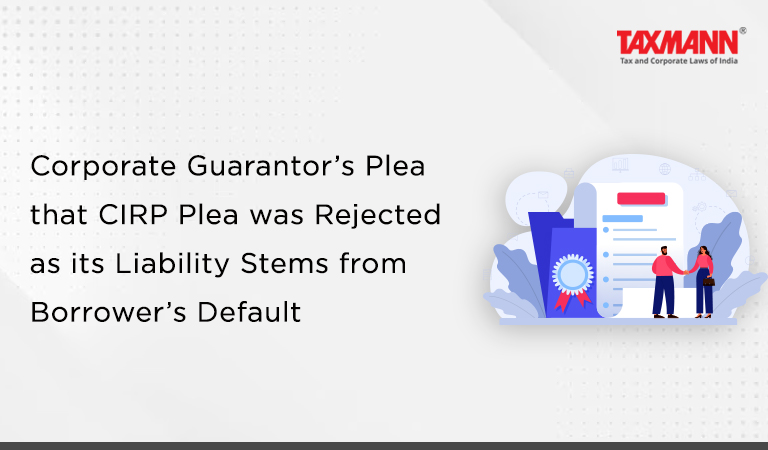Corporate Guarantor’s Plea that CIRP Plea was Rejected as its Liability Stems from Borrower’s Default
- Blog|News|Insolvency and Bankruptcy Code|
- 2 Min Read
- By Taxmann
- |
- Last Updated on 6 June, 2023

Case Details: State Bank of India v. Essel Infraprojects Ltd. - [2023] 150 taxmann.com 349 (NCLT-Mum.)
Judiciary and Counsel Details
-
- Kuldip Kumar Kareer, Judicial Member & Smt. Anuradha Sanjay Bhatia, Technical Member
- Ms Fatema Kachwalla & Virgil Braganza for the Petitioner.
- Ashish Kamat, Harsh Moorjani, Tasneem Zariwala & Saurabh Nikalje, Advs. for the Respondent.
Facts of the Case
In the instant case, the financial creditor granted term loan facilities and working capital facilities to the principal borrower, which were secured by the corporate guarantees issued by the corporate debtor.
From the year 2019, the principal borrower started defaulting in making payments to the financial creditor and its account was declared as Non-Performing Assets (NPA) on 5-12-2019.
Later, on 01-10-2020, the financial creditor issued a demand notice to the principal borrower. However, despite the notice, the principal borrower and corporate debtor failed to cure the default.
Consequently, the financial creditor filed an instant application under section 7 of the IBC to initiate the Corporate Insolvency Resolution Process (CIRP) against the corporate debtor.
The corporate debtor argued that the invocation of the guarantee was made on 1-10-2020 and, therefore, the date of default was 1-10-2020, which was covered within the period provided under section 10A of the IBC. Thus, the corporate debtor claimed that the instant application was not maintainable.
NCLT Held
The National Company Law Tribunal (NCLT) observed that, as per the deed of guarantee, no demand notice was required to be given to the guarantor and the liability of the corporate guarantor came into play when a default was committed by the principal borrower i.e., 5-09-2019. Therefore, the date of notice dated 1-10-2020 was not the date of default.
The NCLT held that the instant application was not hit by section 10A and the same being complete, deserved admission.
List of Cases Referred to
-
- SpiceJet Ltd. v. Credit Suisse AG [2022] 134 taxmann.com 344/171 SCL 92 (Mad.) (para 18)
- Laxmi Pat Surana v. Union of India [2021] 125 taxmann.com 394/166 SCL 318 (SC) (para 25)
- Syndicate Bank v. Channaveerappa Beleri [2006] 11 SCC 506 (para 32).
Disclaimer: The content/information published on the website is only for general information of the user and shall not be construed as legal advice. While the Taxmann has exercised reasonable efforts to ensure the veracity of information/content published, Taxmann shall be under no liability in any manner whatsoever for incorrect information, if any.

Taxmann Publications has a dedicated in-house Research & Editorial Team. This team consists of a team of Chartered Accountants, Company Secretaries, and Lawyers. This team works under the guidance and supervision of editor-in-chief Mr Rakesh Bhargava.
The Research and Editorial Team is responsible for developing reliable and accurate content for the readers. The team follows the six-sigma approach to achieve the benchmark of zero error in its publications and research platforms. The team ensures that the following publication guidelines are thoroughly followed while developing the content:
- The statutory material is obtained only from the authorized and reliable sources
- All the latest developments in the judicial and legislative fields are covered
- Prepare the analytical write-ups on current, controversial, and important issues to help the readers to understand the concept and its implications
- Every content published by Taxmann is complete, accurate and lucid
- All evidence-based statements are supported with proper reference to Section, Circular No., Notification No. or citations
- The golden rules of grammar, style and consistency are thoroughly followed
- Font and size that’s easy to read and remain consistent across all imprint and digital publications are applied



 CA | CS | CMA
CA | CS | CMA
